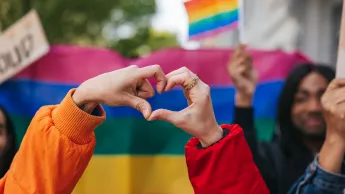How do German universities promote diversity?
- 2024-05-21
- Gunda Achterhold
- Comment

DAAD alumna Dr Rebecca Hahn is committed to making her university a bit more diverse and fair. She works in the University Communications department at the University of Tübingen and is organising this year’s Pride Month there – with a reach that extends far beyond the university.
This June the University of Tübingen is to be fully focused on Pride Month – your preparations are already under way. How did you end up managing it?
I work in the University Communications department and am associated with the – the Centre’s director was also my doctoral supervisor. My doctorate was awarded in English Studies and the topic had a strong gender focus. I was therefore asked if I had the time and interest to be involved in its planning. I’m not coordinating our Pride Month on my own, but rather jointly with the CGDR management and – this is new – the city of Tübingen’s coordinator of equal opportunities for queers. It’s the first time I’ve been involved in the preparations, but I did in the past organise events with similar priorities as part of my English Studies and via the CGDR and its .
You were a co-founder of the Issues Network. What was your objective?
It’s a collaborative feminist space for teaching staff, students and university employees in which for instance we discuss aspects such as patriarchy, sexism in everyday life or discrimination. Hatred and degradation are so prevalent. This is what we hear in our conversations with people who share their experiences with us. We want to act as an alliance that sharpens the perception of where people in our society experience discrimination – even our own experiences.
What impact does this personal commitment have on your work?
This background from my studies, the PhD or also from the network meetings decisively shapes my work. These experiences enable me to see things, texts for example, in a different light. How is a text formulated, is used or are such aspects completely ignored? This is also a highly political issue within University Communications.
Diversity discourses, diversity practices and diversity strategies at universities
All the groups at your university are asked to share their ideas in the preparations for Pride Month. Does that promote diversity?
Our Prorector for International Affairs and Diversity, Professor Monique Scheer, sent an email circular to everyone associated with the university inviting them to participate. The response was exceptionally good. Many people want to be involved; there is huge interest at all levels. We’ve been able to compile a very heterogeneous and creative programme. Including readings, film screenings and a contribution from a postdoc psychologist who uses Lego bricks to question stereotyped role models. Some students have collaborated in preparing a queer lecture series, which I think is also awesome.
What role does the city of Tübingen play in the partnership?
A very key role. The individuals with whom we’re cooperating are unbelievably open-minded; our relationship is very close. We’re publishing a joint press release, for example. Pride Month 2023 was a much smaller affair; it was exclusively organised by the Centre for Gender and Diversity Research. We have a lot more resources this year. Our cooperation with the city, which is using its own channels for our public relations, means that we can achieve a significantly greater impact, including via social media. And we’re using other premises beyond the university.
Does the University of Tübingen use Pride Month to increase its influence on urban society?
Absolutely. Because it’s not just offering university facilities or member events. The Queeres Zentrum Tübingen (QZT, Queers’ Centre Tübingen) is just as much involved as the Frauen*café, Aidshilfe (Aids assistance programme), the small theatre and the Landestheater (LTT, regional theatre). Many different institutions are actively involved.
So what can such a month of events actually achieve?
A lot! It firstly offers students, staff, researchers and alumni who feel like they belong to the LGBTQIA+ community a platform where they can network and exchange ideas. But it also contributes to raising awareness of different identities and gives allies (German ‘Verbündete’) the opportunity to gather information and further their understanding. Celebrating Pride Month is also over time intended to promote an inclusive and supportive environment. It should show that, yes there is a large queer community here that is supported and recognised.
Is the topic of diversity also evident in alumni relations?
The group of alumni is also a very diverse community. We are committed to ensuring that the heterogeneity of students, staff, and alumni is also recognised, valued and celebrated in this community. All of these issues naturally influence our work. For Pride Month, we’re organising two events jointly with alumni who are sharing their expertise. One alumna, a medic who provides special consultation addressing trans*gender leanings and gender incongruence at Tübingen University Hospital, will speak about transgender health in Tübingen and give an account of her activity within the trans* consultation. Another alumnus will address his everyday issues as a trans* man. He explicitly wishes to engage in conversation. Even about very private issues.
What would you like to achieve through Pride Month?
What I would like is that as many people as possible take the time to participate in the really sensational events. That we improve our skills, learn more, join the discussion, and that we continue to enjoy respectful interaction. And yes, that we acknowledge there’s still a lot to be done.
